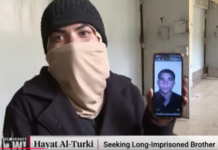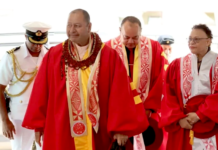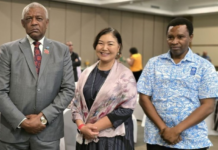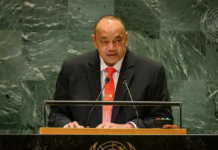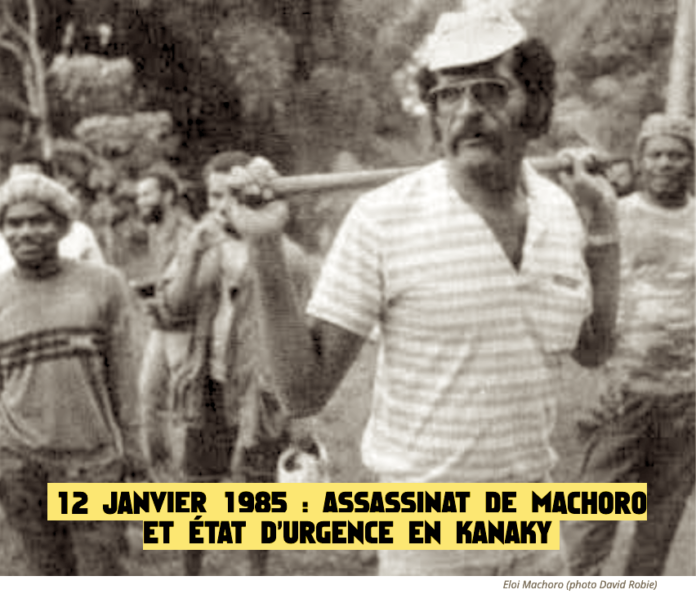
COMMENTARY: By Eugene Doyle
“Only the struggle counts . . . death is nothing.” Éloi Machoro — “the Che Guevara of the Pacific” — said this shortly before he was gunned down by a French sniper on 12 January 1985.
Machoro, one of the leaders of the newly-formed FLNKS (Kanak and Socialist National Liberation Front) — today the main umbrella movement for New Caledonia’s indigenous Kanak people — slowly bled to death as the gendarmes moved in.
The assassination is an apt metaphor for what France is doing to the Kanak people of New Caledonia and has been doing to them for 150 years.
- READ MORE: Kanaky New Caledonia unrest: Macron ends day of political talks with both sides
- LISTEN TO RADIO WAATEA: Interview with Jessie Ounei and David Small
- Liberation for New Caledonia’s Kanak people ‘must come’, says media educator — Audio
- ‘You are not alone’ Pacific messages of solidarity for Kanaky
- Other Kanaky New Caledonia crisis reports
As the New Zealand and Australian media fussed and bothered over tourists stranded in New Caledonia over the past week, the Kanaks have been gripped in an existential struggle with a heavyweight European power determined to keep the archipelago firmly under the control of Paris. We need better, deeper reporting from our media — one that provides history and context.
According to René Guiart, a pro-independence writer, moments before the sniper’s bullets struck, Machoro had emerged from the farmhouse where he and his comrades were surrounded. I translate:
“I want to speak to the Sous-Prefet! [French administrator],” Machoro shouted. “You don’t have the right to arrest us. Do you hear? Call the Sous-Prefet!”
The answer came in two bullets. Once dead, Machoro’s comrades inside the house emerged to receive a beating from the gendarmes. Standing over Machoro’s body, a member of the elite mobile tactical unit said: “He wanted war, he got it!”
Weeks earlier, New Zealand journalist David Robie had photographed Machoro shortly before he smashed open a ballot box with an axe and burned the ballots inside. “It was,” says Robie, “symbolic of the contempt Kanaks had for what they saw as the French’s manipulated voting system.”
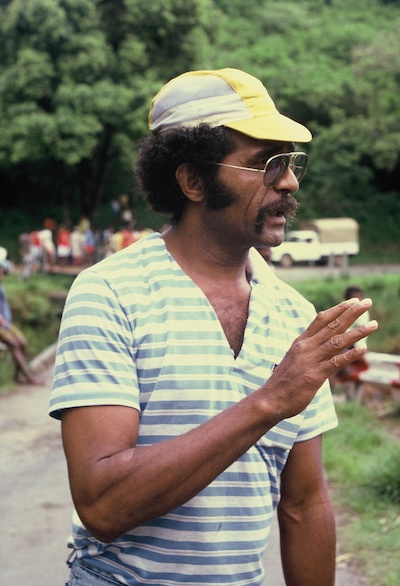
Every year on January 12, the anniversary of Machoro’s killing, people gather at his grave. Engraved in stone are the words: “On tue le révolutionnaire mais on ne tue pas ses idées.” You can kill the revolutionary but you can’t kill his ideas. Why don’t most Australians and New Zealanders even know his name?
Decades after his death and 17,000 km away, the French are at it again. Their National Assembly has shattered the peace this month with a unilateral move to change voting rights to enfranchise tens of thousands of more recent French settlers and put an end to both consensus building and the indigenous Kanak people’s struggle for self-determination and independence.
Thanks to French immigration policies, Kanaks now number about 40 percent of the registered voters. New Zealand and Australia look the other way — New Caledonia is France’s “zone of interest”.
But what’s not to like about extending voting rights? Shouldn’t all people who live in the territory enjoy voting rights?
“They have voting rights,” says David Robie, now editor of Asia Pacific Report, “back in France.” And France, not the Kanaks, control who can enter and stay in the territory.
Back in 1972, French Prime Minister Pierre Messmer argued in a since-leaked memo that if France wanted to maintain control, flooding the territory with white settlers was the only long-term solution to the independence issue.
Robie says the French machinations in Paris — changing the boundaries of citizenship and voting rights – and the ensuing violent reaction, is effectively a return to the 1980s — or worse.
The violence of the 1980s, which included massacres, led to the Matignon Accords of 1988 and the Nouméa Accords of 1998 which restricted the voting to only those who had lived in Kanaky prior to 1998 and their descendents. Pro-independence supporters include many young whites who see their future in the Pacific, not as a white settler colonial outpost of France.
Most whites, however, fear and oppose independence and the loss of privileges it would bring.
After decades of calm and progress, albeit modest, things started to change from 2020 onwards. It was clear to Robie and others that French calculations now saw New Caledonia as too important to lose; it is a kind of giant aircraft carrier in the Pacific from which to project French power. It is also home to the world’s third-largest nickel reserves.
How have the Kanaks benefitted from being a French colony? Kanaks were given citizenship in their own country only after WWII, a century after Paris imposed French rule. According to historian David Chappell:
“In practice, French colonisation was one of the most extreme cases of native denigration, incarceration and dispossession in Oceania. A frontier of cattle ranches, convict camps, mines and coffee farms moved across the main island of Grande Terre, conquering indigenous resisters and confining them to reserves that amounted to less than 10 percent of the land.”
It was a pattern of behaviour similar to France’s colonies in Africa, Asia and the Caribbean. Little wonder the people of Niger have recently become the latest to expel them.
Deprived of education — the first Kanak to qualify for university entrance was in the 1960s — socially and economically marginalised, subjected to what historians describe as among the most brutal colonial overlordships in the Pacific, the Kanaks have fought to maintain their languages, their cultures and their identities whilst the whites enjoy some of the highest standards of living in the world.
David Robie, author of Blood on Their Banner – Nationalist Struggles in the South Pacific, and a sequel, Don’t Spoil My Beautiful Face: Media, Mayhem and Human Rights in the Pacific, has been warning for years that France is pushing New Caledonia down a slippery slope that could see the country plunge back into chaos.
“There was no consultation — except with the anti-independence groups. Any new constitutional arrangement needs to be based around consensus. France has now polarised the situation so much that it will be virtually impossible to get consensus.”
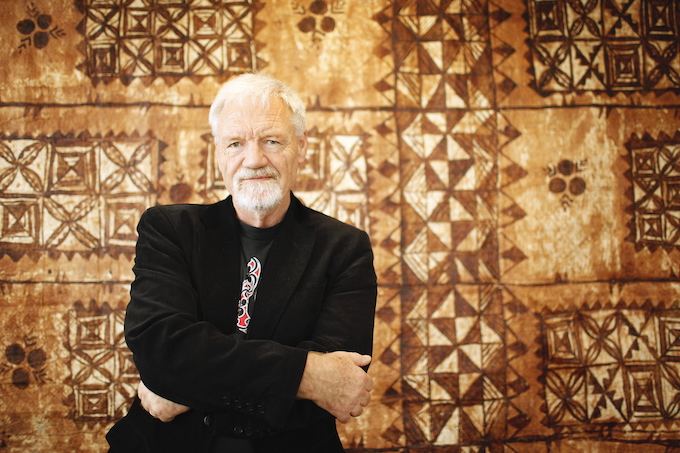
Macron also pushed ahead with a 2021 referendum on independence versus remaining a French territory. This was in the face of pleas from the Kanak community to hold off until the covid pandemic that had killed thousands of Kanaks had passed and the traditional mourning period was over.
Macron ignored the request; the Kanak population boycotted the referendum. Despite this, Macron crowed about the anti-independence vote that inevitably followed: “Tonight, France is more beautiful because New Caledonia has decided to stay part of it.”
Having created the problem with actions like the disputed referendum and the current law changes, Macron now condemns today’s violence in New Caledonia. Éloi Machoro rebukes him from the grave: “Where is the violence, with us or with them?” he asked weeks before his killing. “The aim of the [law changes] is to destroy the Kanak people in their own country.” That was 1985; as the French say: “Plus ça change, plus c’est la même chose. The more things change, the more they stay the same thing.
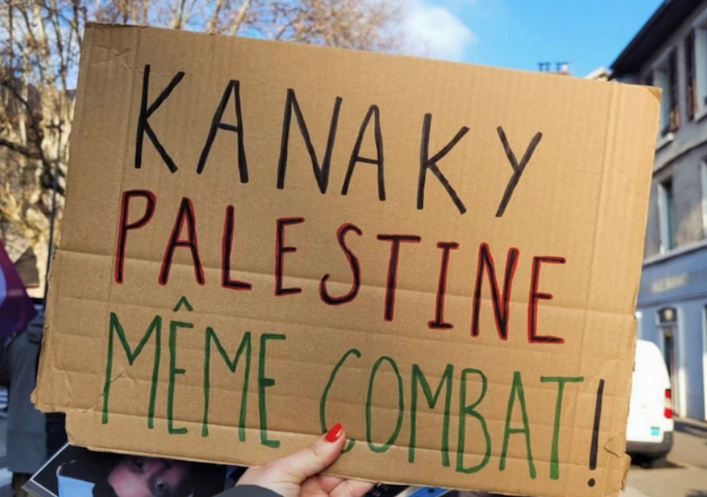
Young people are at the forefront of opposing Paris’s latest machinations. Hundreds have been arrested. Several killed. The White City, as Nouméa is called by the marginalised Melanesians, is lit by arson fires each night. Thousands of French security forces have been rushed in.
Leaders who have had nothing to do with the violence have been arrested; an old colonial manoeuvre.
“What happened was clearly avoidable,” Robie says “ The thing that really stands out for me is: what happens now? It is going to be really extremely difficult to rebuild trust — and trust is needed to move forward. There has to be a consensus otherwise the only option is civil war.”
Nadia Abu-Shanab, an activist and member of the Wellington Palestinian community, sees familiar behaviour and extends her solidarity to the people of Kanaky.
“We Palestinians know what it is for people to choose to ignore the context that leads to our struggle. Indigenous and native people have always been right to challenge colonisation. We are fighting for a world free from the racism and the theft of resources and land that have hurt and harmed too many indigenous peoples and our planet.”
Eugene Doyle is a Wellington-based writer and community activist who publishes the Solidarity website. His first demonstration was at the age of 12 against the Vietnam War. This article was first published at Solidarity under the title “The French are at it again: New Caledonia is kicking off”. For more about Éloi Machoro, read Dr David Robie’s 1985 piece “Éloi Machoro knew his days were numbered”.


